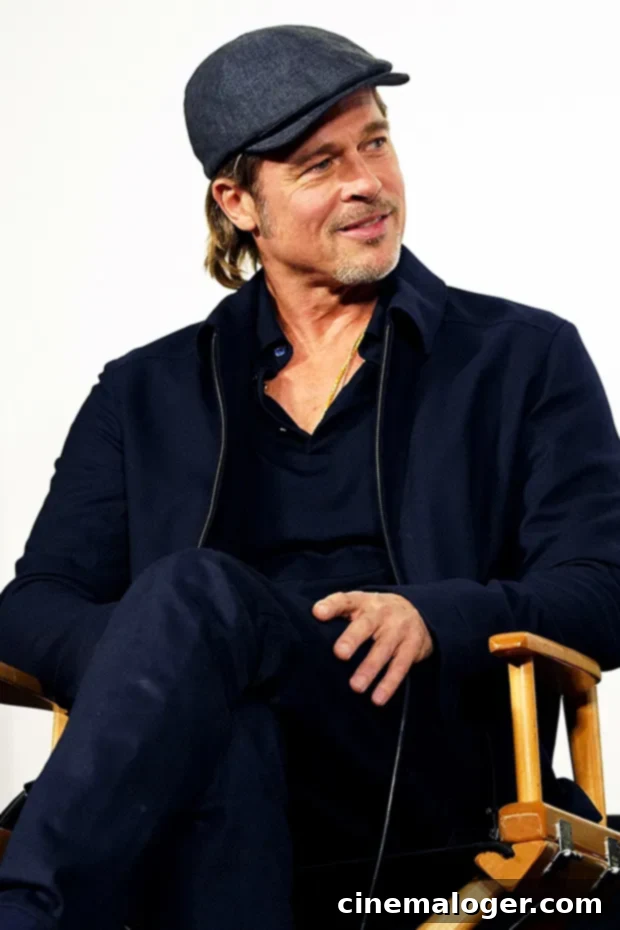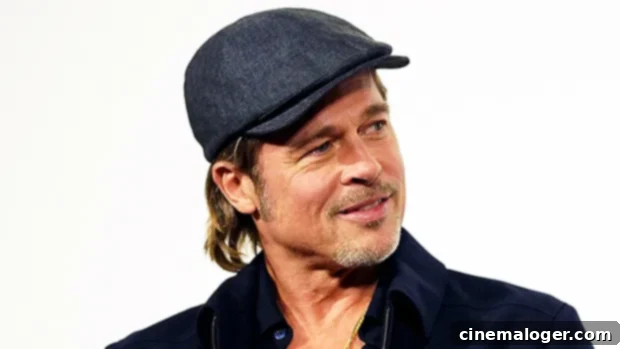Hollywood Icon Brad Pitt’s Incognito Stand for Justice at Black Lives Matter Protest in Los Angeles
In a powerful yet understated act of solidarity, renowned actor Brad Pitt joined thousands of demonstrators on June 7 in Los Angeles, participating in a Black Lives Matter protest that swept through the city. His presence, initially unnoticed by many in the fervent crowd, became a poignant symbol of celebrity engagement with a movement demanding racial justice and an end to police brutality. Pitt’s decision to attend the march, prompted by the tragic death of George Floyd, resonated deeply as he deliberately opted for anonymity, donning a sweatshirt emblazoned with Floyd’s name and his motorcycle helmet to blend into the sea of protesters.
The image, later circulated by the Daily Mail and captured by eagle-eyed yoga instructor Aree Khodai, revealed the Oscar-winning actor’s quiet commitment. Unlike some public figures who leverage their celebrity status to draw attention, Pitt’s intention appeared to be one of pure participation and support for the cause. This subtle yet significant gesture highlighted a growing trend among public figures to use their platforms, not just through words, but through their physical presence, to underscore the gravity of societal issues. His presence among the diverse crowd of Angelenos underscored the widespread public outrage and collective desire for systemic change in the wake of Floyd’s death.
Aree Khodai, who managed to snap the now-iconic photo of Pitt amidst the throng, commented on his genuine engagement. “He was there for the right reasons, he wasn’t trying to draw attention to himself,” Khodai told the Daily Mail. “He seemed into it and seemed inspired. It was so beautiful of him to be there. At one point he had his mask off and he was smiling. He seemed very happy.” This observation paints a picture of a celebrity genuinely moved by the moment, choosing to be a participant rather than an observer or a figurehead. His quiet demeanor and apparent joy in solidarity spoke volumes, aligning perfectly with the sentiment that actions often speak far louder than any carefully crafted statement.

The protests that erupted across the United States in late May and early June 2020 followed the horrific killing of George Floyd, a 46-year-old Black man, by white police officer Derek Chauvin in Minneapolis on May 25. The disturbing video footage of Chauvin kneeling on Floyd’s neck for over nine minutes, leading to his death, ignited a global outcry and reignited widespread conversations about racial injustice, systemic racism, and police brutality within America. Millions took to the streets, not just in major cities like Los Angeles, but in towns and communities across all 50 states and internationally, demanding accountability, police reform, and a re-evaluation of societal structures that perpetuate inequality. These demonstrations represented one of the largest civil rights movements in recent history, transcending racial, social, and economic divides.
Brad Pitt, known for his distinguished acting career and generally private life, has typically maintained a relatively low profile, especially in the months leading up to the protest. After celebrating a monumental Oscar win for his role in Once Upon a Time In Hollywood in February, he largely remained out of the public eye. He was briefly photographed spending time with his friend, Alia Shawkat, at the beginning of March, just before the widespread implementation of coronavirus quarantine measures. With stay-at-home orders gradually lifting in Los Angeles by early June, Pitt began to reappear in public on a few occasions, occasionally caught by paparazzi, but none with the same weight and significance as his protest attendance.
His appearance at the Black Lives Matter protest was not just a casual public outing but a deliberate, conscious choice to lend his support to a critical social cause. It marked a powerful moment where a global superstar chose to stand shoulder-to-shoulder with ordinary citizens fighting for fundamental human rights. The decision to wear a “George Floyd” sweatshirt was a direct tribute to the man whose death became a catalyst for change, emphasizing solidarity with the victim and the broader movement for justice. The motorcycle helmet further amplified his desire to participate without drawing attention to himself, allowing the focus to remain squarely on the message of the protest rather than his celebrity status.
The importance of celebrities like Brad Pitt participating in such movements cannot be overstated. While their individual presence might seem small in a crowd of thousands, their commitment can inspire millions more globally. It sends a message that these issues transcend specific communities and are worthy of attention from all segments of society, regardless of status or background. When a figure of Pitt’s stature quietly joins a march, it can help validate the cause for those who might otherwise be skeptical, and it encourages further dialogue and engagement among his vast fanbase and the wider public. This type of authentic activism resonates more deeply than mere social media posts or official statements, demonstrating a personal investment in the struggle for equality.
Earlier in the month, Brad Pitt was once again photographed on his motorcycle, an activity he seems to enjoy, highlighting his attempts at a relatively normal life despite his fame. Even then, despite his attempts at going incognito with a helmet, a fan recognized him, and Pitt graciously stopped to take a selfie. This prior interaction, while casual, provides a small insight into his public approach – approachable yet private. However, his participation in the June 7 protest carried a far greater weight. While he has not released an extensive public statement regarding George Floyd’s death or the broader Black Lives Matter movement, his actions on the streets of Los Angeles definitively spoke volumes. By physically joining the demonstration, Brad Pitt made an unequivocal statement of support, demonstrating that in moments of critical social upheaval, some voices choose to be heard not through amplified words, but through dedicated, personal presence and profound solidarity, setting a powerful example for conscientious citizenship.
